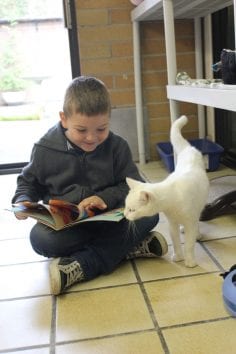Patience. Responsibility. Unconditional love. Reflect for a moment, and you can undoubtedly recall an important life skill or two that you learned from having pets as a child.
“Animals make great teachers,” says Paula Neuman, humane education manager for the BC SPCA. “But not all children have the opportunity to learn about animals at home.” That is why BC SPCA school programs, which bring animals to the kids, are so important: research shows that children who interact with animals have greater empathy.
Why teach empathy?
 “When kids are willing and able to see things from an animal’s perspective, they learn empathy,” says Neuman. This empathy can then extend to their relationships with each other. Children who have high levels of empathy are less likely to be aggressive to others. They tend to be more tolerant of cultural and racial differences. They are also better equipped to deal with emotional challenges.
“When kids are willing and able to see things from an animal’s perspective, they learn empathy,” says Neuman. This empathy can then extend to their relationships with each other. Children who have high levels of empathy are less likely to be aggressive to others. They tend to be more tolerant of cultural and racial differences. They are also better equipped to deal with emotional challenges.
“Putting themselves in someone else’s place allows them to better understand how their actions affect others,” says Neuman. “That’s an important step in preventing violence in the classroom, and encouraging prosocial behaviours like sharing and cooperation.”
Why focus on kids?
 Quite simply, it is an investment in the future. “Our programming has the long-term aim of creating a more humane society,” says Neuman. “The logical place to start to achieve that change is with youth.” It is especially important to reach children between eight and 13 years of age, when they are developmentally the most receptive to developing empathy skills.
Quite simply, it is an investment in the future. “Our programming has the long-term aim of creating a more humane society,” says Neuman. “The logical place to start to achieve that change is with youth.” It is especially important to reach children between eight and 13 years of age, when they are developmentally the most receptive to developing empathy skills.
Why include animals?
 Most children are naturally drawn to animals, and BC SPCA school programs connect with this innate curiosity. “By focusing on animals, we can capture kids’ attention and build on their interests and experiences,” says Neuman. Studies confirm that when children are interested in a subject, the lessons are more likely to stick.
Most children are naturally drawn to animals, and BC SPCA school programs connect with this innate curiosity. “By focusing on animals, we can capture kids’ attention and build on their interests and experiences,” says Neuman. Studies confirm that when children are interested in a subject, the lessons are more likely to stick.
Why choose BC SPCA school programs?
“Our programming enables educators to reach students who may not be exposed to animals otherwise,” says Neuman. BC SPCA school programs include a suite of curriculum-blended lesson plans on pet care, farm animals, dog bite safety, social justice and leadership, as well as classroom presentations by specially-trained BC SPCA humane educators.
 These animal-themed presentations complement the lesson plans by allowing students to ask questions of a humane educator and, whenever possible, interact with a visiting temperament-tested pet. The presence of the pet reinforces the empathy-building taking place.
These animal-themed presentations complement the lesson plans by allowing students to ask questions of a humane educator and, whenever possible, interact with a visiting temperament-tested pet. The presence of the pet reinforces the empathy-building taking place.
By learning about and interacting with animals in fun and engaging ways, says Neuman, kids begin to better understand the inherent value of all living things. As a result, not only do they actively make caring and compassion a part of their daily lives, but they in turn encourage others to do the same. “We believe that this kind of ‘pay it forward’ education will have a positive effect for generations to come,” she says.
For more information on all BC SPCA school programs, visit spca.bc.ca/school.
